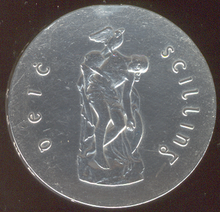Ten shilling (Irish coin)
| Ireland | |
| Value | 120 (old) pence |
|---|---|
| Mass | 18.14 g |
| Diameter | 30.0 mm |
| Edge | Plain with inscription |
| Composition | Silver, Copper |
| Years of minting | 1966 |
| Catalog number | — |
| Obverse | |
| Design | Bust of Patrick Pearse |
| Design date | 1966 |
| Reverse | |
 |
|
| Design | Cú Chulainn |
| Designer | Thomas Humphrey Paget |
| Design date | 1966 |
The ten shilling (10s) (Irish: deich scilling) coin was a one-off commemorative coin issued in Ireland in 1966 to mark the 50th anniversary of the Easter Rising. Ten shillings was a subdivision of the pre-decimal Irish pound, worth 1⁄2 of an Irish pound, making this the highest value coin in the pre-decimal system.
The coin was 83.5% silver and 16.5% copper. It measured 1.2 inches (30 mm) in diameter and weighed 18.144 grams, therefore containing 0.4871 troy ounces (15.15 g) of silver. The coin did not prove popular, and 1,270,000 of the two million produced were withdrawn and melted down. This unpopularity may be due to the ten shilling Series A Banknote which was then in circulation. Twenty thousand coins were issued as proofs in issue cases.
The reverse design featured the death of Cú Chulainn, the mythical Irish hero, who is seen tied to a stone and with a raven on his shoulder. The figure of Cú Chulainn is a miniature of the statue by Oliver Sheppard, in the General Post Office, Dublin. The coin was produced for the 50th anniversary of the Easter Rising and commenced circulation on 12 April 1966 and was designed by Thomas Humphrey Paget.
The ten shilling is the only Irish coin to feature an inscription on edge until the Irish euro coins, this is "Éirí Amach na Cásca 1916", which translates as "1916 Easter Rising"; the inscription was in Gaelic type on a plain edge. The coin is also unique in being the only modern circulated Irish coin (before the introduction of Euro) not to feature the harp on the obverse side, instead featuring the portrait of Patrick Pearse the revolutionary, further making it unique among Irish coinage in that it is the sole coin to feature the image of anyone associated with Irish history or politics. This coin is the first Irish commemorative coin issued by the Irish state, first Irish modern coin to feature a person, and the first official coin to commemorate the 1916 Easter Rising. Also interesting, the thickness of this coin is uneven, the edge of the coin being thicker than the centre.
...
Wikipedia
